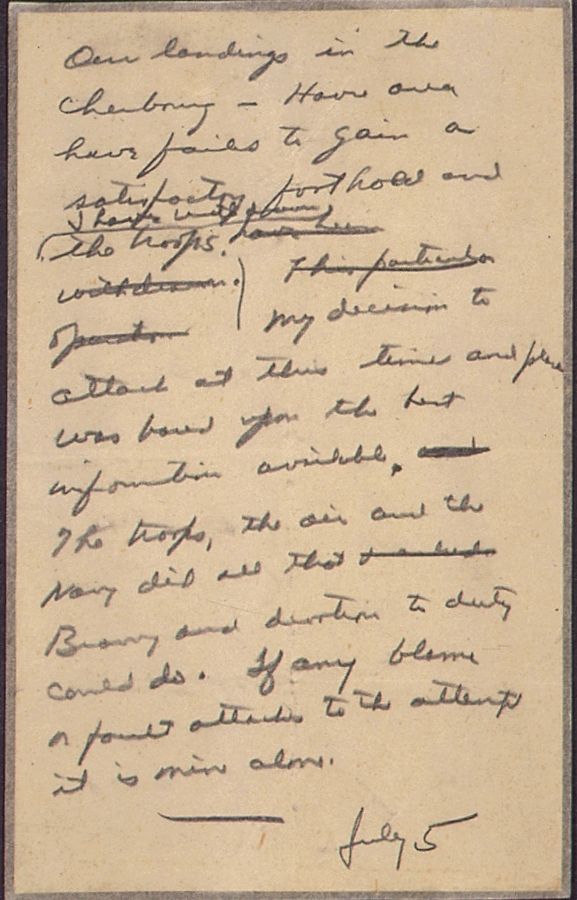In a previous article about how you can control just your efforts and not the outcomes of those efforts, I detailed Dwight Eisenhower’s weather-induced dilemma on the eve of the Allied invasion of Normandy in June 1944.
The Success of the Normandy Invasion Was Not Entirely in Eisenhower’s Control
Despite a year of intense planning and preparation under Eisenhower’s leadership, the Allied invasion’s success ultimately depended on the weather across the English Channel. Their landings hinged on suitable weather—something entirely beyond their control.
Eisenhower tentatively planned to send his troops across the English Channel on 5-June. On 4-June, however, the troops predicted cloudy skies, rain, and heavy seas that threatened the invasion. Although the following day’s weather was not necessarily ideal, it was comparatively more suitable than the 5-June, so Eisenhower postponed the invasion by a day. If he did not invade on 6-June, the tides would not favor an invasion for another two weeks, which would possibly give the Germans enough time to get wind of the Allies’ plan.
Early in the morning of 5-June, Eisenhower gathered his advisers’ and military officers’ opinions on whether to launch the attack despite the less-than-suitable weather. He sat quietly in deep contemplation. One of his advisers later recalled, “I never realized before, the loneliness and isolation of a commander at a time when such a momentous decision has to be taken, with full knowledge that failure or success rests on his judgment alone.”
After five minutes, Eisenhower gazed at his advisers and said, “Well, we’ll go!”
With those words, Eisenhower launched the D-Day invasion of Europe on 6-June. After issuing those marching orders, events passed from Eisenhower’s control. He then realized that the invasion’s success was no longer in his hands. Its outcome depended on 160,000 allied troops, thousands of commanders, and hundreds of lieutenants. Eisenhower had done everything in his power to coordinate their efforts and create conditions conducive to the mission’s success. After issuing his orders, all he could do was let those conditions come to fruition on their own terms. After all his efforts, he could not control the outcomes—he let go of the outcomes.
An Authentic Leader in Action: Eisenhower’s Character, Responsibility, & Accountability
That evening, on his way to visit American and British paratroopers (pictured above) who were headed into battle that night, Eisenhower told his driver, “I hope to God I’m right.”
Just before he went to bed at night, Eisenhower scribbled a note and tucked it into his wallet. He thought he would use this letter if the invasion went wrong. (Eisenhower mistakenly dated the note July 5 instead of June 5.)
Our landings in the Cherbourg-Havre area have failed to gain a satisfactory foothold and I have withdrawn the troops. My decision to attack at this time and place was based upon the best information available. The troops, the air and the Navy did all that bravery and devotion to duty could do. If any blame or fault attaches to the attempt it is mine alone.

Observe that Eisenhower crossed out “This particular operation” and wrote “My decision to attack.” This demonstrates Eisenhower’s assertive and responsible leadership in action. He wrote, “any blame or fault … is mine alone” and underscored the phrase “mine alone.” He did not use passive language or try to camouflage failure with phrases like, “as fate would have had it,” “unaccommodating weather,” “forecast not met,” “mistakes were made,” or “we tried really hard, but ….”
Eisenhower was an authentic leader in action—a leader who was ready and willing to accept unshrinking responsibility for his actions and their results.
Eisenhower won his wager with the weather. The invasion of Normandy was successful and proved to be a turning point in World War II. Eisenhower never used the note he had prepared on the eve of the attack. It is now on display at Dwight D. Eisenhower Library and Museum in Abilene, Kansas.
Authentic Leaders Demonstrate Accountability
As exemplified by Dwight Eisenhower’s leadership as the Supreme Allied Commander during World War II, authentic leaders recognize the accountability that comes with their roles. They accept absolute responsibility for the expected outcomes—both good and bad—no matter what the situation is. They don’t blame unfavorable circumstances, the external environment, employees, superiors, customers, or anybody else.
Leave a Reply